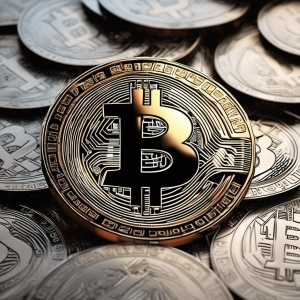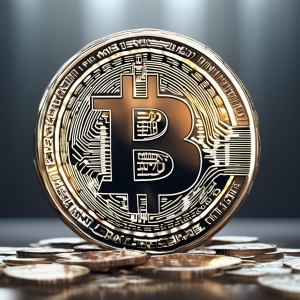Table of Contents:
Introduction: Emergence of Bitcoin and the Concept of Decentralization
The year 2009 marked the birth of Bitcoin, a digital currency that transformed our conventional understanding of money. Unlike traditional currencies issued and governed by central banks, Bitcoin operates through a decentralized network of computers spanning across the globe.
Bitcoin's underlying technology, blockchain, ensures a secure and transparent transaction network that is free from centralized control. This inherent feature of decentralization eliminates the need for intermediaries such as banks or governments.
The Best Mining Providers at a Glance
» Infinity HashFrom our perspective, currently the best mining provider on the market. With the community concept, you participate in a mining pool completely managed by professionals. A portion of the earnings are used for expansion and maintenance. We've never seen this solved as cleanly anywhere else.
» Hashing24A well-known and established cloud hosting company. With a good entry point and in a good market phase, a good ROI can also be generated with some patience. Unfortunately, we see the durations as a major drawback.
As transactions are made, they are verified by Bitcoin miners who contribute their computing power to solve complex mathematical problems. Once the transactions are confirmed, they are added to the blockchain which forms an immutable record of all transactions. By eliminating third-party intervention, Bitcoin offers a high degree of privacy and control over one's funds.
Now, the question arises - can such a groundbreaking form of money like Bitcoin emerge again? As we proceed through the article, we aim to provide an answer to this intriguing question.
Exploring Decentralization: How Bitcoin Triumphed
What catapulted Bitcoin to its triumph is indeed its unique property of decentralization. By operating on a decentralized network, it enabled transactions free from censorship, interference, or governmental manipulation. Besides, the universal accessibility of Bitcoin has made it a go-to financial solution in regions with limited banking infrastructure.
Another cornerstone of Bitcoin's victory lies in Satoshi Nakamoto's breakthrough innovation - the Proof of Work (PoW) consensus algorithm. PoW ensures that no single entity can gain control over the network, thereby preserving decentralization.
Every miner bids for the chance to add a new block to the Bitcoin blockchain through a process known as mining. This process involves solving a complex mathematical problem. The higher the computational power devoted, the higher the chance of being rewarded, contributing to the network's security.
The limited supply of 21 million bitcoins further spurred their value, branding it 'digital gold'. As Bitcoin's acceptance grew globally, its market capitalization skyrocketed, leading to a whole new market of cryptocurrencies, hoping to replicate its success.
Pros and Cons of Cryptocurrency
| Pros | Cons |
|---|---|
| Increased financial inclusivity | Regulatory concerns and potential for misuse |
| Greater transparency with blockchain technology | Lack of understanding or trust in new currency systems |
| Ease of global transactions | Potential for volatile valuations |
The Revolution of Decentralized Currency

Decentralization has revolutionized the concept of currency, leading to the emergence of numerous cryptocurrencies since the advent of Bitcoin. This monetary movement was largely spurred by Bitcoin's success, spearheading financial autonomy for individuals and corporates alike.
The propagation of this decentralization revolution directly challenges the customary banking structures by offering an alternative, more open, secure and transparent financial system. The traditional barriers present in cross-border transactions, exorbitant transaction fees, and the need for intermediaries to fulfill financial transactions are all being decisively addressed.
The rise of decentralized finance (DeFi) is a testament to this revolution. DeFi uses blockchain technology to recreate and improve the existing financial system. It allows for financial transactions to occur with complete transparency without any form of central authority.
It’s clear that a new era of digital finance is dawning, and it is not restrained solely to Bitcoin. The market is presently abounded with various cryptocurrencies each with their own unique attributes, aiming to solve specific problems within established systems.
Understanding the Phenomenon of Bitcoin's Rise
In order to grasp the future of decentralized coins like Bitcoin, it is essential to understand the reasons behind its meteoric rise. Aside from its disruptive technology, the success of Bitcoin can largely attributed to its first-mover advantage. Being the pioneer in the space, Bitcoin was able to establish itself and gain the trust of potential investors before any other cryptocurrency even existed.
The design of Bitcoin was meticulously planned. With its limited supply, it encapsulated the principle of scarcity, typically associated with precious metals such as gold. It offered a refreshing form of 'digital gold', thus attracting significant investments.
The peer-to-peer nature of Bitcoin transactions struck a chord with those frustrated with the traditional banking system. The promise of reduced transaction costs, increased transaction speed, especially for cross-border transfers, and autonomy in managing one’s own assets were some of the reasons why people gravitated towards Bitcoin.
Further, Bitcoin's price is determined purely by market demand, and its deflationary nature tends to make it a preferred store of value amidst economic instability. It has hence served as a hedge against inflation, especially in countries experiencing economic turmoil. Such qualities have made Bitcoin more than just a medium of exchange but a potential candidate for a universal reserve asset.
Bitcoin also introduced a sense of financial inclusion unreachable by the traditional banking system. With just an internet connection, anyone could participate in the Bitcoin network, making decentralized finance a reality for those excluded from traditional banking frameworks.
The Challenges and Opportunities for a New Bitcoin

It's crucial to remember that the success of Bitcoin was not an overnight triumph. It took years for Bitcoin to earn its present status, facing numerous hurdles such as regulatory scrutiny, skepticism, and technical issues along the way. Therefore, the journey for a new decentralized coin may likely encounter similar hardships and even more, given the saturated and competitive nature of today's cryptocurrency market.
Regulatory intervention across the globe plays a crucial role when it comes to the mass adoption of any new cryptocurrency. Alongside, the cryptographic coin must offer exceptional security and convenience compared to the already established cryptocurrencies and traditional financial systems for users to shift their preferences. Fulfilling these two conditions can be a formidable challenge for any budding digital coin.
Despite the challenges, there lies a realm of opportunities for a new coin to thrive in the vastness of the digital currency world. For instance, while Bitcoin has pioneered the path of financial revolution, it does have its set of drawbacks. It's noteworthy that Bitcoin transactions can be relatively slow and expensive, especially when the network experiences high traffic. Moreover, while being decentralized, it lacks some level of privacy as transaction details are available on the public blockchain.
These inadequacies present an opportunity for new coins to improve upon. A new decentralized coin could be designed to facilitate faster, cheaper, and more private transactions. Furthermore, approaching sustainability could also give a new coin a competitive edge over Bitcoin, which is often criticized for its high energy consumption due to its Proof of Work mechanism.
In conclusion, the possibility of another decentralized coin like Bitcoin being victorious might very well lie in its ability to not just replicate Bitcoin's strengths but also to innovate and address its imperfections.
Assessing the Probability of Another Decentralized Bitcoin
The question at the forefront of our discussion is whether another decentralized coin like Bitcoin can emerge. Given Bitcoins unparalleled success, this question is indeed of relevance. However, the answer does not rest on a simple yes or no. Here's why:
Decentralization is a core principle of the cryptocurrency landscape, and it is integral to the virtually thousands of cryptocurrencies already in existence, many of which provide more sophisticated features and scalability than Bitcoin. Examples are Ethereum, with its advanced smart contract technology, or Ripple's XRP which offers fast and low-cost international transactions.
On the one hand, the likelihood of a new coin replicating Bitcoins success is slim. The market is already saturated with options and opportunities. Additionally, Bitcoin continues to enjoy the first mover advantage and the trust it has built over the years. A new coin would need to provide significant technological advantages and gain widespread acceptance to achieve similar status.
On the other hand, innovation is relentless in the crypto world. We continue to see emerging cryptocurrencies and blockchain technologies pushing the envelope, concocting ingenious solutions to current problems like PoW's energy consumption issues or blockchain's scalability challenges. In the future, a new decentralized coin that outperforms Bitcoin in these areas could potentially gain notable prominence.
Overall, while it is improbable that a new cryptocurrency will match Bitcoin's impact and popularity, the continual advancement in blockchain technology makes the emergence of an innovative and potent decentralized coin a definite possibility.
Conclusion: The Future of Decentralized Coins

As we venture forward into the realm of cryptocurrencies, we find ourselves faced with endless possibilities. Digital currencies like Bitcoin have not only revolutionized financial systems but have also paved the way for myriad innovations in blockchain technology.
New cryptocurrencies with different use cases continue to emerge. While some focus on improving transaction speeds and reducing costs, others are championing for more privacy, transparency, and decentralized control. Therefore, rather than contemplating about another Bitcoin, it's more crucial to focus on how new models of decentralized currencies can bring about important changes to financial systems and how they can cater to evolving needs and demands in the years to come.
One thing is certain though, the era of decentralized coins is just beginning. With a growing interest from institutions and retail investors alike, the next decentralized coin to experience a Bitcoin-like success might just be on the horizon. Our role as knowledgeable investors is to stay updated, adapt, and navigate through these exciting times with diligence and precision.
FAQs on "Can a decentralized coin like Bitcoin emerge again?"
What is a decentralized coin?
A decentralized coin is a type of digital or virtual currency that uses cryptography for security. It operates independently of a central bank and its creation and transactions are open to the public on a blockchain.
Can a similar coin like Bitcoin emerge again?
Yes, it's possible. However, it would require a unique selling proposition that distinguishes it from Bitcoin and other existing cryptocurrencies.
What made Bitcoin successful?
Bitcoin's success can be attributed to several factors - Its decentralized nature, limited supply, and wide acceptance make it an attractive alternative to traditional currencies.
What are the challenges to create a new decentralized coin?
Some challenges include gaining widespread acceptance, ensuring security of transactions, dealing with regulatory issues, and competition from existing cryptocurrencies.
Are all decentralized coins cryptocurrencies?
Yes, all decentralized coins are examples of cryptocurrencies. These are digital or virtual currencies that use cryptography for security and operate independently of a central bank.








